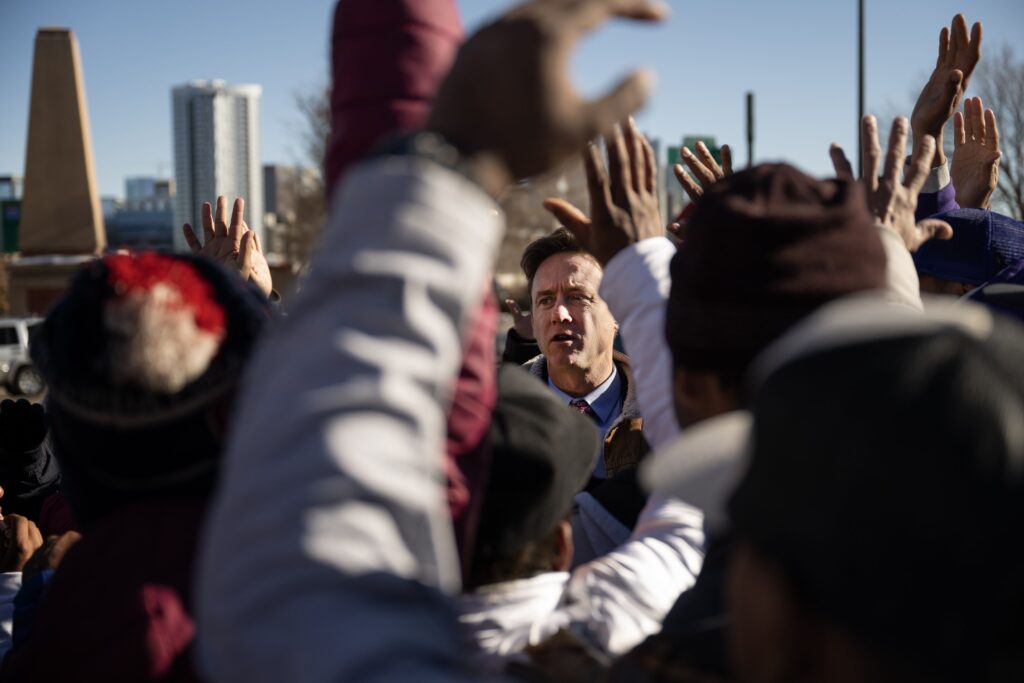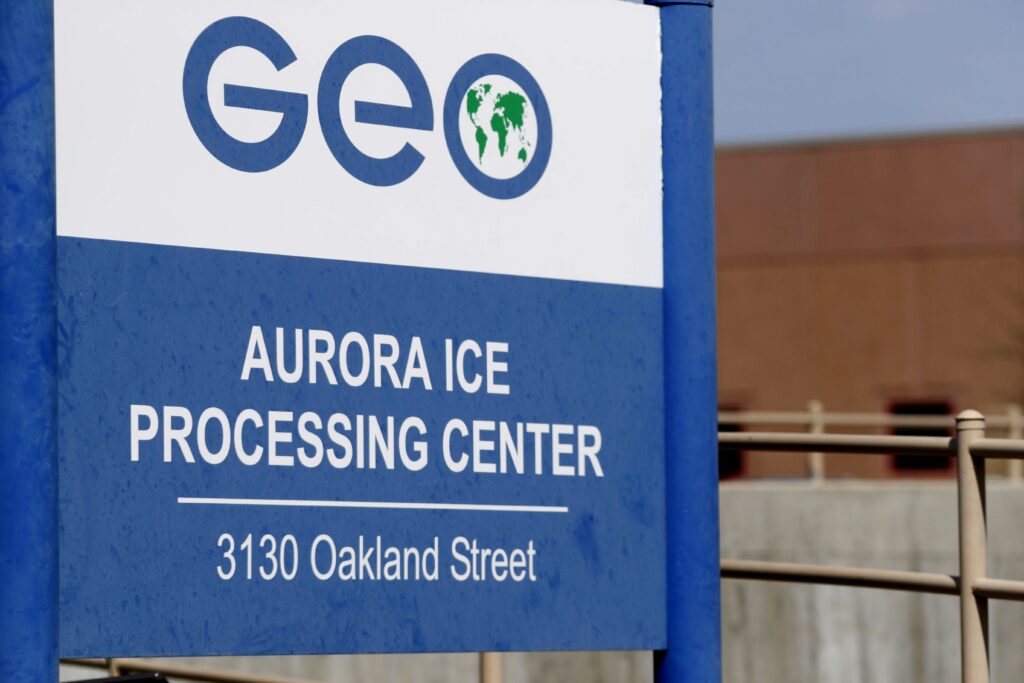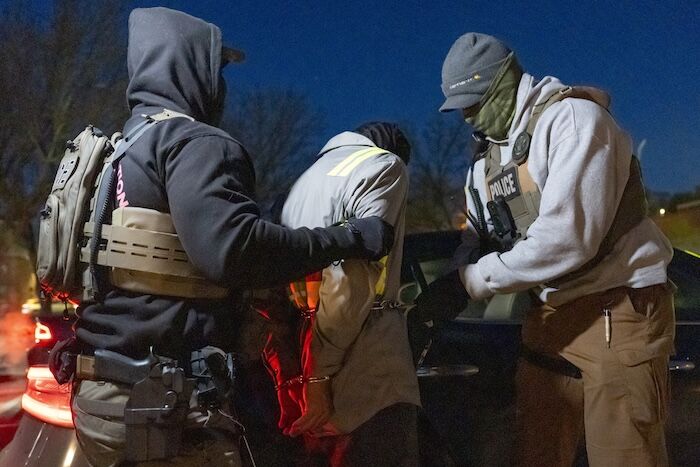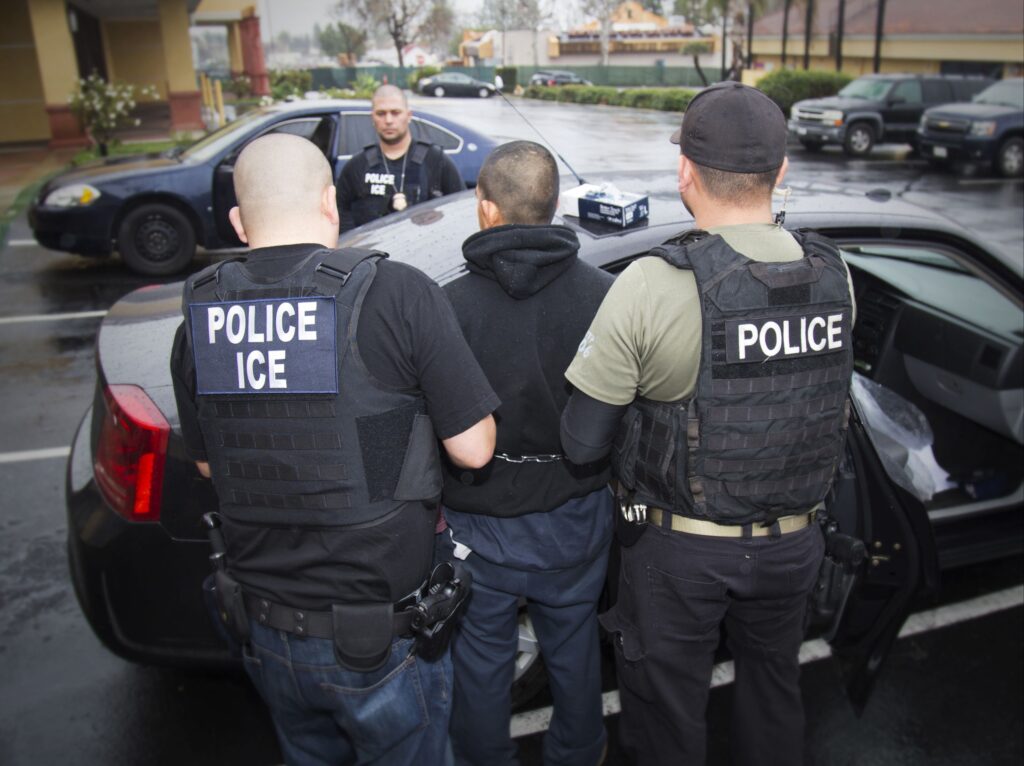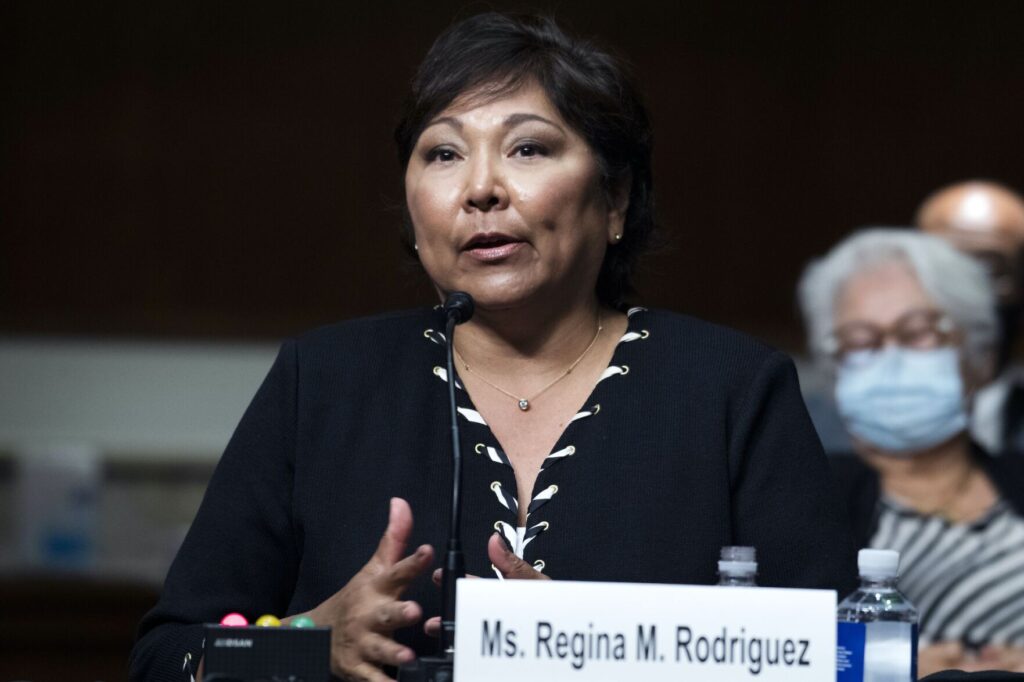ACLU sues Trump administration over ICE arrests in Colorado
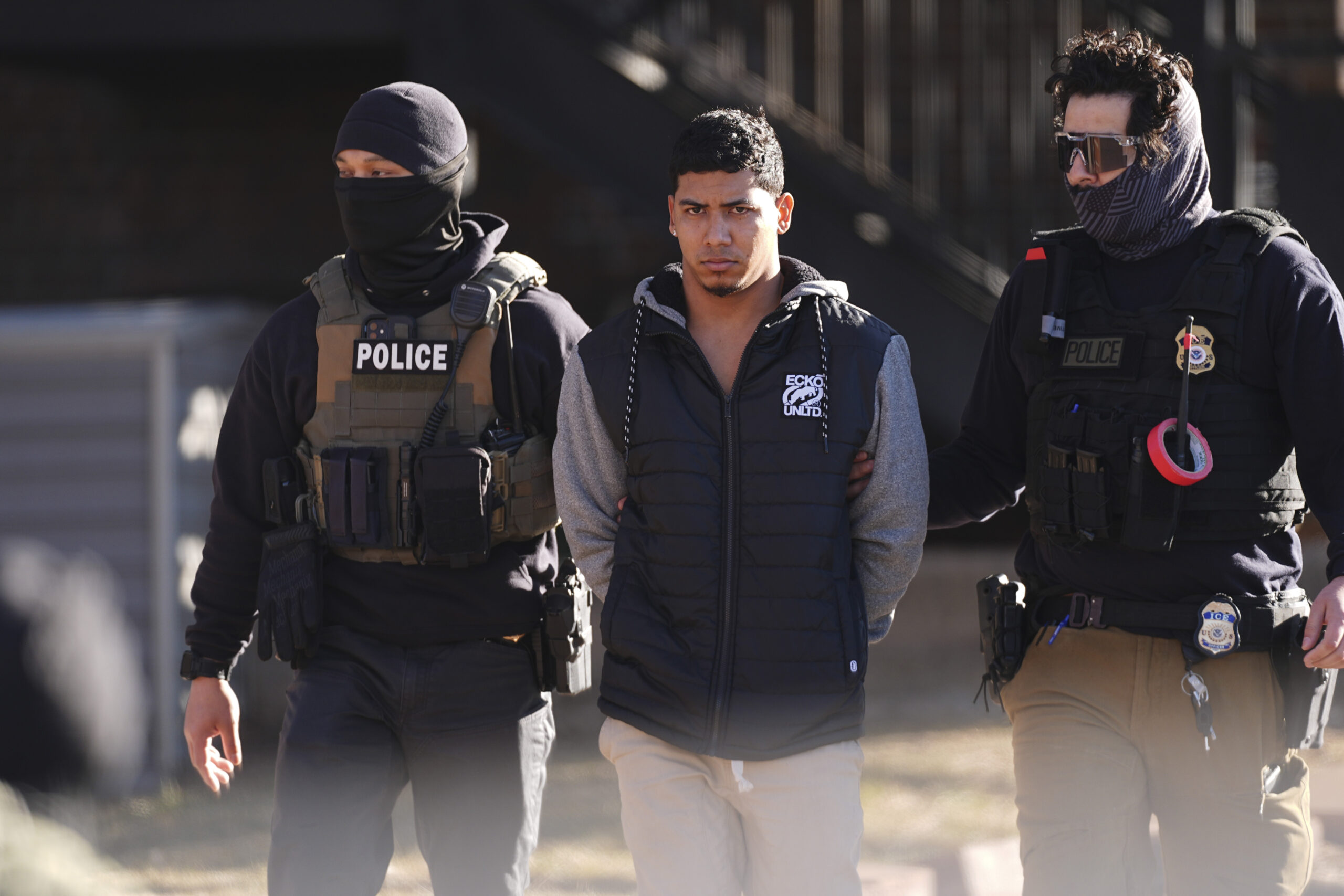
The ACLU of Colorado has sued the Trump administration, alleging that Immigration and Customs Enforcement officials carried out unlawful, warrantless arrests as part of a broad effort to detain immigrants living in the United States without legal status.
The lawsuit was brought on behalf of a legal permanent resident, a “Dreamer” brought to the country as a child, and an asylum seeker, all of whom have lived in the country for more than a decade.
A “dreamer” is a colloquial term for an immigrant who was brought illegally to the United States as a child and is eligible for protection from deportation under the Deferred Action for Childhood Arrivals (DACA) program.
The lawsuit seeks declaratory and injunction relief.
“They are going door-to-door, sweeping apartment parking lots, and confronting residents and neighbors walking near their homes or jobs,” the complaint claimed, referring to immigration agents. “They are pulling over workers and college students going about their daily lives. ICE agents are then arresting Latino people without warrants, without probable cause, and without assessing legal status and flight risk as required by law.”
Since assuming office in January, President Donald Trump has embarked on a mass deportation effort, a key campaign promise. That effort has drawn lawsuits.
Federal data suggest that arrests have more than doubled since the spring, according to TRAC Immigration at Syracuse University.
Nearly 60,000 people across the United States were being detained in August.
To make a dent in the 14 million immigrants estimated to be living illegally in the U.S. — according to the Pew Research Center — House Deputy Chief of Staff Stephen Miller instructed ICE in June to make 3,000 arrests a day.
That’s up from the 650 arrests a day in the first five months of Trump’s second term.
ICE agents arrested nearly 2,000 people in Colorado alone in the first half of the year, according to the complaint.
“There’s no realistic way ICE can meet their quota numbers without breaking the law,” said Hans Meyer, a Denver immigration attorney.
Meyer represents the four immigrants named in the suit.
Meyer added: “They’re not going to change unless a court steps in and makes them change.”

Supporters of the immigration crackdown said they trust that federal immigration agents are following the law.
In an earlier interview, Aurora City Councilwoman Danielle Jurinsky said she was aware of at least one person detained and later released on bond by ICE at Whispering Pines, one of three troubled apartment complexes owned by CBZ Management, which nabbed headlines last year over the activities of a Venezuelan gang that gained a foothold in metro Denver.
Jurinsky said she doesn’t believe federal agents have acted inappropriately.
“If they are doing things without judicial oversight, that would be concerning to me,” Jurinsky said. “I have to trust that they are; that they are doing things the right way.”
Meanwhile, the Federation for American Immigration Reform, or FAIR, had noted ICE can lawfully enter if given consent or under other legal authorities, including criminal warrants, administrative code inspections or exigent circumstances.
“I would be shocked if ICE were attempting to forcibly enter private residences on an administrative warrant,” Matthew O’Brien, FAIR deputy executive director said in an email to The Denver Gazette, in reference to questions about the warrants used in Colorado.
The ACLU’s complaint relies on national media outlets that have reported a change from “targeted and investigation-based operations” to the administration encouraging “immigration agents to ‘turn the creative knob up to 11’ when it comes to enforcement including through arrests collateral to anyone actually identified in a warrant.”
The roughly 200,000 immigrants living unlawfully in Colorado “now live in fear and at daily risk because of federal immigration agents’ indiscriminate practices,” the complaint said. “ICE’s arrest scheme is tearing families apart and terrorizing communities.”
Two of the plaintiffs — Refugio Ramirez Ovando, a 43-year-old construction worker and Caroline Dias Goncalves, a 19-year-old University of Utah college student — were pulled over while driving.
In the case of Ramirez, ICE agents pulled him over on May 19 looking for someone else.
Dias was pulled over by a Mesa County Sheriff’s deputy near Fruita on June 5.
J.S.T, a 36-year-old asylum seeker, was detained by ICE agents while pulling out of the parking lot at the Whispering Pines Apartment complex in Aurora on Feb. 5, while on his way to work. J.S.T was held in the Aurora Detention Center for four weeks, according to the complaint.
G.R.R., a 32-year-old was arrested on April 27 outside the nightclub raided by federal agents in Colorado Springs. According to the complaint, G.R.R. was held for six weeks in the Aurora Detention Center.
None has a “criminal” record, the complaint maintained.
The Trump administration has said its operations target criminal aliens and, specifically, “the worst of the worst.”
As previously reported by The Denver Gazette, federal agents from a joint operation that included the Rocky Mountain Field Division of the U.S. Drug Enforcement Administration (DEA), ICE and the FBI earlier this year appear to have largely carried out immigration raids with limited judicial oversight.

DEA agents executed two judicial search warrants at a property, according to Steffan Tubbs, a spokesperson for the DEA’s Rocky Mountain Field Division. More apartments than that, however, were breached that day.
In the days following the Feb. 5 raid, The Denver Gazette submitted Freedom of Information Act (FOIA) requests to ICE, DEA and the FBI seeking copies of the warrants used to justify the forced entry into private residences.
After touting the immigration raids on social media, both the DEA and FBI have refused to release the warrants, citing what’s called a “Glomar” denial — a response that allows agencies to neither confirm nor deny the records exist.
One of the individuals represented in the lawsuit brought by the ACLU of Colorado was detained as part of the Feb. 5 raids, which included the Whispering Pines Apartment complex in Aurora, one of three said to have been overtaken by the Venezuelan prison gang Tren de Aragua (TdA).
Authorities have said TdA gang members have been involved in drug trafficking, kidnapping, money laundering, extortion and human trafficking.
The organization has an estimated 3,000 to 5,000 members, according to Ronna Rísquez, a Venezuelan investigative journalist.
Trump cited the gang during a campaign stop in Colorado, in which he unveiled his plan to crack down on immigrants unlawfully staying in the U.S. and who have been found to be guilty of violent crimes or facing such charges.
“We are a country under tremendous distress” Trump said at a campaign stop in Aurora last year. “We will send elite squads from ICE to deport every single gang member.”
Roughly 600 miles from the southern border with Mexico, Denver hasn’t always been the magnet for immigrants that it became three years ago when the Mile High City began to see an influx.
In the ensuing months, roughly 43,000 immigrants — mostly from South and Central America, particularly Venezuela — came in Denver. About half, when considering the number of tickets for travel purchased, have stayed.
The Associated Press contributed to this report.


